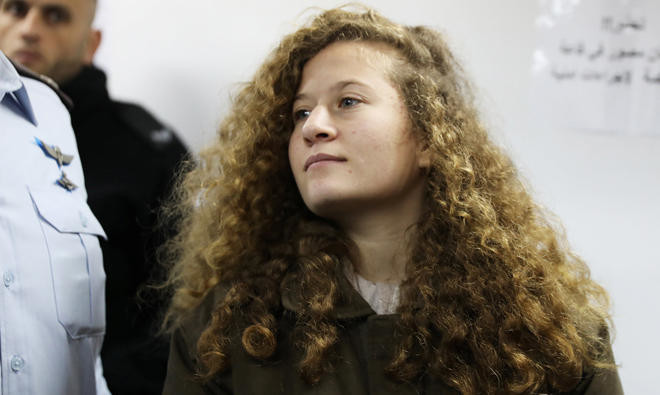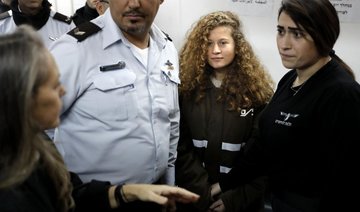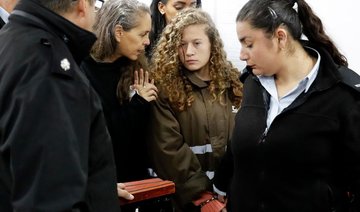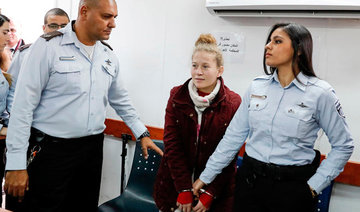JERUSALEM: A senior Israeli official on Wednesday said he led a secret investigation into 16-year-old Palestinian protest icon Ahed Tamimi and her family, in part because their appearance — including “blond-haired, freckled” children in “Western clothes” — made them seem less like “real” Palestinians.
The stunning comments by Michael Oren, a deputy minister and former ambassador to the US, promptly drew accusations of racism from the family — the latest twist in a case that has turned into a public relations headache for Israel.
The case revolves around Israel’s handling of Ahed Tamimi, who was arrested on Dec. 19 for slapping two Israeli soldiers outside her West Bank home four days earlier.
Video of the scuffle quickly spread, giving Ahed worldwide attention. The girl, noticeable for her long blond curls, and her mother are now being held in jail. Ahed faces charges that carry up to 14 years in prison.
Oren told The Associated Press that he had led a classified parliamentary investigation into the Tamimis two years ago in which Israeli security agencies and diplomats participated.
The family has a long history of leading protests against Israeli policies in the West Bank that often turn into clashes with soldiers in their village of Nabi Saleh and Ahed has been involved in highly publicized scuffles with soldiers in the past.
Oren said his investigation looked into whether the protests were genuine or whether the family members were provocateurs, paid to send children to clash with soldiers.
Derisively calling the skirmishes caught on tape “Pallywood,” Oren claimed that “someone” was funding the unrest to harm Israel’s image, without providing evidence.
“The Tamimi family and those claiming to be part of the Tamimi family have been provoking Israeli soldiers for many, many years now,” he said. “The children were chosen on the basis of their external look, to look Western, freckled, and blond-haired.”
“They were dressed as Westerners,” he added. “They don’t dress the way children dress in the West Bank, for a very specific purpose: To get soldiers to react violently to them, to take pictures of this violence and to spread it around the world in order to delegitimize, discredit the state of Israel.”
He called it a “very sophisticated operation” that has succeeded in manipulating the Western press.
In an interview with Israeli Channel 10 TV, Oren claimed one boy appeared in different videos with a cast on one arm at one protest, and on his other arm at another protest, before disappearing from demonstrations altogether.
In a statement from his office, Oren said: “In discussions held in the committee, the issue of the family’s credibility was raised and if it really is a real family.”
Ahed’s father, Bassem Tamimi, called Oren’s investigation “silly and stupid” and said the investigation was racist.
“We, the Tamimi family, were here in Palestine before the creation of Israel, and we will stay,” he said. “Denying that Palestinians could be blond reflects racism in the Israeli society.”
Ahed has been celebrated by Palestinians as a national hero, and Israel’s treatment of her has drawn the attention of international activists, human rights groups and UN officials.
In the Dec. 15 video, she is seen approaching two soldiers standing outside her home. She yells at them, tells them to leave, then kicks and slaps them as they stand silently.
The family says the girl was upset because a young cousin had been shot in the head and seriously wounded with a rubber bullet fired by Israeli troops. But the altercation drew outrage in Israel over what some had seen as a humiliation of the military.
In a reflection of the tensions, Israel’s Defense Minister Avigdor Lieberman ordered the popular Army Radio station to ban any songs composed by Yehonatan Geffen, a leading journalist and songwriter, because of a poem he published that praised Ahed. Israel’s attorney general ruled that Lieberman has no authority over the station’s programming.
Opposition lawmaker Nachman Shai, a former chief military spokesman who is often critical of the government, acknowledged that the incident has become part of the war for the “hearts and minds” of people around the world.
But he said Israel had no choice in how to handle the case.
“She does not deserve to return home as if nothing happened,” he said. “You cannot ignore it, because that will cause other Palestinians to follow her.”
Tamimi was arrested in an overnight raid on Dec. 19, and her mother was arrested when she visited her daughter at a police station.
An Israeli military court has ordered they both be held for the duration of their trial — a process that is expected to take months. Ahed has been charged with 12 counts of attacking soldiers in five incidents going back to April 2016, while her mother has been charged with incitement. A cousin arrested with Ahed has been released on bail.
The family lawyer, Gaby Lasky, said the trial is scheduled to begin on Jan. 31, Ahed’s 17th birthday. She said she was hopeful the prosecutors would not seek the maximum 14-year sentence for the girl and would agree to a reduced sentence of several months.
Ahed is currently being held in a special prison wing for minors, where her conditions have improved, Lasky said. For the first week while she was interrogated, she said Ahed was not provided with a change of clothes or a coat, and threatened with the arrests of other family members if she did not talk.
Asked about Oren’s investigation, she said she was “ashamed” to hear a parliamentary committee was dealing with “wild conspiracy theories.”
Israel official doubted Palestinian protest icon, her family
Israel official doubted Palestinian protest icon, her family

Qatari minister of state, IAEA chief discuss ‘serious threat’ of Israeli strikes on Iran’s nuclear sites

- Mohammed bin Abdulaziz Al-Khulaifi reiterates Qatar’s condemnation of attacks on Iranian territory
- He said targeting nuclear facilities threatens regional, international security
LONDON: The Qatari Minister of State for Foreign Affairs Mohammed bin Abdulaziz Al-Khulaifi on Tuesday discussed the conflict between Israel and Iran with Rafael Grossi, the director general of the International Atomic Energy Agency.
Al-Khulaifi discussed in a call the Israeli attacks on Iranian nuclear facilities that began on Friday, targeting the Natanz, Fordo, and Isfahan nuclear sites.
Al-Khulaifi stressed that targeting nuclear facilities was a serious threat to regional and international security. He reaffirmed Qatar’s commitment to dialogue to resolve conflicts and achieve peace in the region.
The officials discussed ways to improve the security of nuclear facilities and ensure they are safeguarded against threats, the Qatar News Agency reported.
Al-Khulaifi reiterated Qatar’s strong condemnation of the Israeli attacks on Iranian territory, deeming them blatant violations of Iran’s sovereignty and security, the QNA added.
The IAEA reported on Monday that the Israeli airstrike on Iran’s Natanz facility on Friday damaged the centrifuges of the underground uranium enrichment plant, raising concerns about potential radiological and chemical contamination in the area.
US pulls out of two more bases in Syria, worrying Kurdish forces

- The SDF did not respond to questions about the current number of troops and open US bases in northeastern Syria
AL-SHADADI BASE: US forces have pulled out of two more bases in northeastern Syria, visiting reporters found, accelerating a troop drawdown that the commander of US-backed Syrian Kurdish forces said was allowing a resurgence of Daesh.
The reporters who visited the two bases in the past week found them mostly deserted, both guarded by small contingents of the Syrian Democratic Forces — the Kurdish-led military group that Washington has backed in the fight against Daesh for a decade.
Cameras used on bases occupied by the US-led military coalition had been taken down, and razor wire on the outer perimeters had begun to sag.
A Kurdish politician who lives on one base said there were no longer US troops there. SDF guards at the second base said troops had left recently but refused to say when.
HIGHLIGHTS
• No US troops present at Al-Wazir and Tel Baydar bases.
• Daesh threat ‘has significantly increased’, SDF commander says.
The Pentagon refused to comment.
It is the first confirmation on the ground by reporters that the US has withdrawn from Al-Wazir and Tel Baydar bases in Hasaka province.
It brings to at least four the number of bases in Syria US troops have left since President Donald Trump took office.
Trump’s administration said this month it will scale down its military presence in Syria to one base from eight in parts of northeastern Syria that the SDF controls.
The New York Times reported in April that troops might be reduced from 2,000 to 500 in the drawdown.
The SDF did not respond to questions about the current number of troops and open US bases in northeastern Syria.
But SDF commander Mazloum Abdi, who spoke at another US base, Al-Shadadi, said the presence of a few hundred troops on one base would be “not enough” to contain the threat of Daesh.
“The threat of Daesh has significantly increased recently. But this is the US military’s plan. We’ve known about it for a long time ... and we’re working with them to make sure there are no gaps and we can maintain pressure on Daesh State,” he said.
Abdi spoke on Friday, hours after Israel launched its air war on Iran. He refused to comment on how the new Israel-Iran war would affect Syria, saying simply that he hoped it would not spill over there and that he felt safe on a US base.
Hours after the interview, three Iranian-made missiles targeted the Al-Shadadi base and were shot down by US defense systems, two SDF security sources said.
Daesh ruled vast swathes of Iraq and Syria from 2014 to 2017 during Syria’s civil war.
Regional war puts Palestinian disarmament in Lebanese camps on hold

- Dimashkieh affirmed that “the dialogue committee is fully committed to the joint statement issued by the Lebanese and Palestinian presidents”
- Palestinian sources told Arab News that significant resistance has emerged within Palestinian ranks over Abbas’s quick acceptance of disarmament deadlines
BEIRUT: A Palestinian official in Lebanon announced “the postponement of the scheduled collection of weapons from Palestinian refugee camps due to the current situation in the region.”
The announcement came just hours before the Lebanese government was set to begin disarming Palestinian refugee camps in Beirut and its suburbs this week.
Citing a Lebanese official familiar with Palestinian affairs in Lebanon, Palestinian news agency WAFA stated that “Palestine renewed its commitment to the joint statement issued on May 21 following the meeting held between Lebanese President Joseph Aoun and President Mahmoud Abbas in Beirut.”
He added that the statement emphasized “Lebanon’s sovereignty, the extension of state authority, and the exclusive right of the Lebanese state to bear arms, as well as the need to end any manifestations outside its authority.
“Palestinian security and military bodies will begin full cooperation with the Lebanese security forces as agreed upon when conditions permit and after the necessary preparations are completed,” the official said.
On the Lebanese side, the only statement issued in this regard was by Ramez Dimashkieh, head of the Lebanese-Palestinian Dialogue Committee, who said that “he received a call from Azzam Al-Ahmad, secretary-general of the Palestine Liberation Organization, during which they discussed the latest developments.”
Dimashkieh affirmed that “the dialogue committee is fully committed to the joint statement issued by the Lebanese and Palestinian presidents, which clearly emphasized respect for Lebanese sovereignty, the principle of exclusive state control over weapons, and the necessity of ending the visible presence of Palestinian arms, according to a specific timeline.”
Youssef Al-Zari’i, Fatah’s media representative in Sidon, confirmed that Palestinian factions, including Fatah and Islamic movements, all expressed willingness to hand over weapons and allow Lebanese authority throughout the country.
However, he argued that delays are “reasonable given the delicate regional situation,” with implementation tied to evolving Middle Eastern dynamics.
Palestinian sources told Arab News that significant resistance has emerged within Palestinian ranks over Abbas’s quick acceptance of disarmament deadlines. “Multiple Palestinian factions, particularly within Fatah, are uncomfortable with Abbas’s hasty agreement to weapon collection schedules,” one insider said.
Beyond regional timing issues, fundamental questions about execution mechanisms remain unresolved.
“Fatah claims it holds limited heavy weapons in Lebanese camps compared to other groups, especially Hamas,” a source said.
Since Fatah’s weapons belong to the internationally recognized Palestinian Authority and operate under Lebanese oversight, unilateral disarmament could create dangerous imbalances.
“If Fatah surrenders its arsenal while Hamas and affiliated groups retain theirs, Fatah becomes vulnerable within camp dynamics,” the source warned.
Hamas continues defending its Lebanese weapons as legitimate resistance tools while deflecting surrender demands through broader political arguments. The group links disarmament to comprehensive refugee solutions, including return rights and enhanced social protections for displaced populations in Lebanon.
Palestinian camps across Lebanon emphasize that sustainable solutions must address living standards, legal rights including property ownership, while maintaining respect for Lebanese sovereignty and law.
The Lebanese and Palestinian presidents announced in a joint statement issued following their meeting a few weeks ago “the formation of joint committees to address the issue of Palestinian weapons in refugee camps and to monitor the situation in the Palestinian camps.”
They affirmed their commitment to the principle of placing all weapons under Lebanese state control.
According to a joint Lebanese-Palestinian census conducted in 2017, the number of Palestinian refugees in Lebanon is estimated at around 200,000. Many live in harsh conditions within camps overseen by Palestinian factions and forces, which consider the possession of arms as integral to both the right of return and the broader struggle for the liberation of Palestine.
Lebanon is home to 12 official Palestinian refugee camps, along with dozens of other communities dispersed across the country.
The presence of weapons in Palestinian camps in Lebanon dates back to the 1969 Cairo Agreement between the PLO and the Lebanese government.
The agreement stipulated that Palestinians were permitted to establish military bases in southern Lebanon and conduct political activities within the camps, effectively legitimizing armed Palestinian presence on Lebanese soil and in camps.
However, following a civil war in which Palestinian weapons played a dominant role, Lebanon officially annulled the agreement in 1987.
Weapons are distributed unevenly among the camps. Heavy weapons are found in the Ain Al-Hilweh camp, the most overcrowded camp and home to the various politically and militarily diverse factions, and in the Rashidieh camp in the Tyre region.
This is in contrast to the Nahr Al-Bared camp in the north, which is completely devoid of weapons. It has been under the control of the Lebanese Army since 2007, following violent battles that lasted for more than three months between the Lebanese Army and Fatah Al-Islam, which launched attacks against the military that killed dozens.
The disarmament process was scheduled to begin this week in the Shatila, Mar Elias, and Burj Al-Barajneh camps in Beirut and its southern suburbs.
“A committee was supposed to be formed to oversee implementation. There were discussions about assigning this role to the Lebanese-Palestinian Dialogue Committee, which was seen by some as the appropriate authority. However, others dismissed it as a political body unrelated to the issue. This raised further questions: Who would assume responsibility for internal Palestinian affairs once weapons were handed over? Who would manage security inside the camps? And who would handle the cases of wanted individuals and those who had taken refuge there?” a Palestinian source stated.
In recent months, the Lebanese Army has confiscated weapons from Palestinian military sites supported by the Syrian regime and located in the Bekaa Valley on the border with Syria. The most important of these was a base in Qusaya belonging to the Popular Front for the Liberation of Palestine, General Command and Fatah Al-Intifada, confiscating their equipment and ammunition.
Before the outbreak of the Nahr Al-Bared camp battles, Lebanese political leaders had agreed during national dialogue talks to disarm Palestinians outside the camps within six months.
This commitment was later echoed in the 2008 Doha Agreement, which outlined a national defense strategy that included addressing Palestinian arms both inside and outside the camps.
However, these decisions were never implemented. In the years that followed, Ain Al-Hilweh, the largest Palestinian refugee camp in Lebanon, repeatedly witnessed violent clashes among rival Palestinian factions.
Israel closes Al-Aqsa Mosque, Church of the Holy Sepulchre under ‘emergency’ measures

- Most shops in Jerusalem’s Old City have been closed, with only essential stores remaining open since Friday
- Palestinians in Jerusalem fear for their safety due to lack of proper shelters amid Israel-Iran conflict
LONDON: Israeli authorities in occupied East Jerusalem have imposed a closure for the fifth consecutive day on the Al-Aqsa Mosque and the Church of the Holy Sepulchre while barring non-resident visitors from entering the Old City.
Israel announced a state of emergency after beginning airstrikes against Iran on Friday. Tehran retaliated by launching ballistic missiles at Israeli coastal towns and cities. Israel’s emergency measures prevented Palestinians and worshipers from entering the Al-Aqsa Mosque and its courtyards, as well as the Church of the Holy Sepulchre.
The Palestinian Authority’s Jerusalem Governorate added on Tuesday that most shops in the Old City had been closed, with only essential stores remaining open since Friday, Wafa news agency reported.
Israeli authorities have permitted settlers to visit the area surrounding the Al-Aqsa compound and perform Jewish prayers and rituals, while forces have intensified daily raids on Palestinian towns and suburbs in Jerusalem, including the Mount of Olives, Silwan, Issawiya, Shufaat, Hizma, Eizariya, Bir Nabala and Al-Ram, Wafa added. East Jerusalem is surrounded by 84 checkpoints and barriers, including recently installed earth mounds and gates.
Although Jerusalem has been spared so far from the Israel-Iran conflict, Palestinians in the city fear for their safety due to a lack of proper shelters within their towns and neighborhoods, Wafa reported.
Israeli authorities in Jerusalem have announced the opening of schools to be used as shelters from Iranian missile attacks. However, some Palestinian experts warned that the facilities may not be large enough to accommodate a significant number of residents, and some are even unsuitable for receiving civilians.
WHO says Gaza health care at breaking point as fuel runs out

- “For over 100 days, no fuel has entered Gaza and attempts to retrieve stocks from evacuation zones have been denied,” said Peeperkorn
- Peeperkorn said only 17 of Gaza’s 36 hospitals were currently minimally to partially functional
GENEVA: The World Health Organization on Tuesday pleaded for fuel to be allowed into Gaza to keep its remaining hospitals running, warning the Palestinian territory’s health system was at “breaking point.”
“For over 100 days, no fuel has entered Gaza and attempts to retrieve stocks from evacuation zones have been denied,” said Rik Peeperkorn, the WHO’s representative in the Palestinian territories.
“Combined with critical supply shortages, this is pushing the health system closer to the brink of collapse.”
Peeperkorn said only 17 of Gaza’s 36 hospitals were currently minimally to partially functional. They have a total of around 1,500 beds — around 45 percent fewer than before the conflict began.
He said all hospitals and primary health centers in north Gaza were currently out of service.
In Rafah in southern Gaza, health services are provided through the Red Cross field hospital and two partially-functioning medical points.
Speaking from Jerusalem, he said the 17 partially functioning hospitals and seven field hospitals were barely running on a minimum amount of daily fuel and “will soon have none left.”
“Without fuel, all levels of care will cease, leading to more preventable deaths and suffering.”
Hospitals were already switching between generators and batteries to power ventilators, dialysis machines and incubators, he said, and without fuel, ambulances cannot run and supplies cannot be delivered to hospitals.
Furthermore, field hospitals are entirely reliant on generators, and without electricity, the cold chain for keeping vaccines would fail.
The war was triggered by an unprecedented Hamas attack on Israel on October 7, 2023, which resulted in the deaths of 1,219 people, according to official Israeli figures.
The health ministry in Hamas-run Gaza said on Monday that 5,194 people have been killed since Israel resumed strikes on the territory on March 18 following a truce.
The overall death toll in Gaza since the war broke out on October 7, 2023 has reached 55,493 people, according to the health ministry.
“People often ask when Gaza is going to be out of fuel; Gaza is already out of fuel,” said WHO trauma surgeon and emergency officer Thanos Gargavanis, speaking from the Strip.
“We are walking already the fine line that separates disaster from saving lives. The shrinking humanitarian space makes every health activity way more difficult than the previous day.”





















